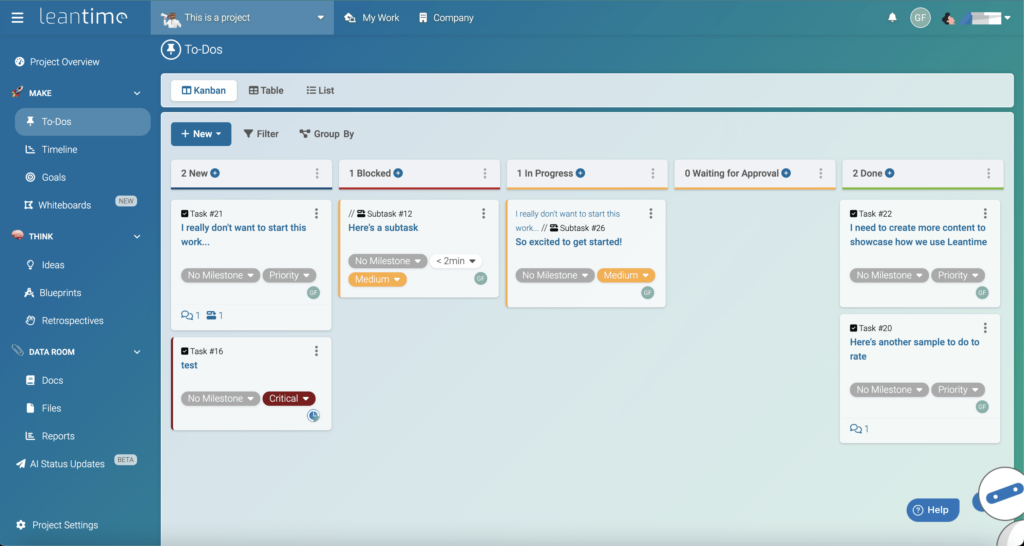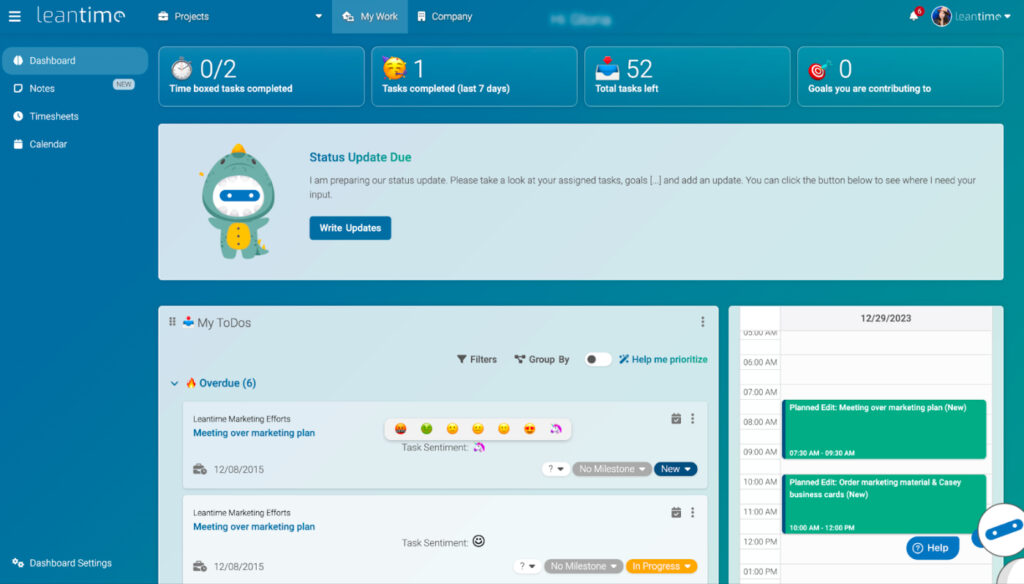Tackling Small Business Struggles: Are You Using Project Management Software to Drive Efficiency and Expansion?

Estimated reading time: 12 minutes
As a small business owner, you constantly juggle tasks, manage teams, and strive for growth. Understanding how effective project management can transform your business operations is important. It can help them achieve goals efficiently and effectively.
In the context of small businesses, project management encompasses the planning, organization, and execution of projects, ultimately contributing to growth and competitive advantage.
We’ll dive into strategies and tools that can streamline your processes, boost your team’s productivity, and drive your business toward greater success.
Whether you’re new to it or looking to refine your approach, we explore how to make your business thrive through smart, efficient management.
Table of contents
Key Takeaways
- Project management software for small businesses must align with specific needs, focusing on crucial factors such as budget, features, scalability, and integration capabilities to ensure successful project execution and business growth.
- Effective management is central to project management software, with important features including task dependency visualization, workflow automation, user-friendly interfaces for quick adoption, and mobile accessibility to aid teams on the move.
- Specialized project management tools cater to distinct business needs, such as teams requiring support for Agile methodologies and real-time progress tracking while providing advanced project management features.

Navigating Project Management as a Small Business
Effective project management is necessary for small businesses to thrive and grow. At its core, it involves project planning, organizing, and executing projects to achieve specific goals.
The critical components include defining project goals, scope, and timelines, assigning and monitoring tasks, and managing resources and budgets.
In a small business context, the role of the project manager is particularly important. The project manager oversees the entire project lifecycle, from initiation to closure, ensuring that projects are completed on time and within budget.
Statistic: 42% of companies fail to recognize the necessity and significance of project management.
They are also responsible for leading and motivating the project team, resolving issues and conflicts, and communicating progress to stakeholders.
Small businesses can use various methodologies such as Agile, Scrum, and Waterfall. Each of these methodologies has its advantages and drawbacks, depending on the specific needs and goals of the business:
Agile
Agile is a flexible, iterative approach emphasizing collaboration, customer feedback, and rapid adaptation to change. This approach is particularly suitable for managing projects with variable requirements or unpredictable outcomes.
Read More: What is a Kanban Board and How to Use It
Scrum
Scrum is a popular Agile framework that focuses on short, time-boxed iterations called sprints. The Scrum team works together to deliver a potentially releasable product increment at the end of each sprint, allowing for continuous improvement and adaptation.
Waterfall
Waterfall is a linear, sequential methodology that follows a strict, predefined process. This method works well for projects with clear requirements and minimal risk of change. However, it can be less flexible and adaptive compared to Agile and Scrum.
Small businesses must carefully consider their unique needs and goals when choosing a methodology. By understanding the basics of project management and selecting the right approach, small businesses can improve efficiency, foster growth, and gain a competitive edge in the marketplace.
Project Management in Small Businesses
As small businesses work hard to meet their objectives, the role of effective project management can’t be overstated. When these businesses adopt solid project management techniques, they start to see things fall into place: better organization, smoother planning, and more successful projects, all of which are key to growing the business.
Over time, it’s clear that project management isn’t just a practice but a core part of a thriving, sustainable business. Small businesses streamline their operations when they put project management at the forefront. This means they use their resources wisely, stick to their budgets, and meet deadlines more consistently.
As a result, they can respond better to their customers’ needs, adapt quicker to changes in the market, and carve out a place for themselves among competitors.
Project management also helps businesses set clear targets, measure their performance, and tweak their strategies when needed, ensuring they keep growing and moving forward.

Choosing the Right Software for Your Small Business
Choosing the right project management solution is not just about finding a tool that can manage your projects. It’s about finding a solution that can adapt to your business’s unique needs and grow with it. In this regard, three crucial factors come into play – budget, basic features, and scalability.
Discover: Easy & Affordable Project Management for Small Businesses
We will look into each of these factors.
Considerations for Budget-Conscious Businesses
In exploring considerations for budget-conscious businesses, it’s crucial to remember that investing wisely can make a significant difference.
Free trials play a crucial role in this decision-making process by allowing you to evaluate the software’s suitability before making a purchase — you ensure a perfect fit for your team’s workflow and objectives.
While affordability is key, the value lies in selecting a tool that elevates your team’s efficiency and contributes to your overarching goals. It’s about making an intelligent choice that feels right for your unique journey as a small business.
Identifying Must-Have Project Management Features
While budget is an important consideration, the features and functionality of the project management software are equally crucial. Some comprehensive key features that small businesses should consider are:
- Task assignment
- Timeline tracking
- Resource allocation
- Budget management
- Time tracking
- Task status
Besides, a user-friendly interface simplifies the process of accessing different features and collaboration tools, thereby preventing unnecessary complications in managing projects.
Read More: How to Create Gantt Charts
More advanced features, such as increased storage, enhanced customer support, and advanced charts, are commonly included in higher-tiered plans. These plans also tend to offer additional viewers, collaboration tools, task automation, and customizations to meet diverse business needs.
Evaluating Scalability and Growth Potential
Your tool’s scalability and growth potential are pivotal in ensuring that your chosen tool can adapt to new requirements (larger projects) and manage projects as your business expands. A scalable software tool should possess features that facilitate growth and expansion of small teams. These include capabilities to streamline through the breakdown of projects into smaller tasks and individual tracking of their due dates.
Quality customer support is vital as it guarantees that issues like software glitches are promptly resolved, preventing any disruption to ongoing projects. Some project management solutions also offer project templates to streamline the project creation process and save time.
When selecting your management software, make sure that it not only fulfills your present needs but also possesses the capacity to evolve with your business.

Task Management Simplified: Tools That Get the Job Done
Once you’ve identified your budget, must-have features, and growth potential, it’s time to delve into the heart of the software – task management. It’s the backbone of any tool, helping you organize your work, manage your team’s workload, and track progress.
Breaking Down Task Dependencies and Workflow
Task dependencies and workflow management form the bedrock of any successful project. Task dependencies refer to the interrelations between project activities that dictate the sequence in which tasks should be carried out.
A good project management software should provide a visual representation of these dependencies, thereby aiding in the effective management of task dependencies.
On the other hand, workflow refers to dividing projects into smaller milestones and measurable tasks. This offers a deeper understanding of processes and aids in optimizing operations to enhance efficiency.
Automation to Save Time and Reduce Errors
Every second saved is a dollar earned in today’s fast-paced business environment. That’s where automation comes into play. Automation features are designed to incorporate:
- Triggers
- Alerts
- Reminders
- Assignments
This improves task organization through decreased reliance on manual input and heightened operational efficiency.
From task creation and assignment to reminders and notifications, automation can greatly reduce manual tasks, thereby saving time and decreasing the probability of errors and omissions in data. Thus, being equipped with powerful automation features can significantly transform your small business.
User-friendly Interfaces for Quick Adoption
Small businesses often bump into distinct project management hurdles. From stretching limited resources thin to juggling multiple projects or navigating the learning curve with little prior expertise, the challenges can seem daunting. Effective strategies and solutions customized for your business can tackle these obstacles.
Choosing the right tools and support for your team is vital. Regardless, navigating today’s market of the tools can be tricky. Many available options end up being more of a hindrance than a help, with their unmanageable interfaces and overwhelming advanced features making them complicated and tough to learn.
This complexity can turn what should be a streamlined process into a frustrating ordeal. It’s important to find tools that simplify rather than complicate your efforts.

Leantime
However, user-friendly tools like Leantime are specifically designed with your needs in mind. Leantime isn’t just another project management tool; it’s about simplifying your team’s workflow with its straightforward features.
Leantime is effective in task assignment, progress tracking, and resource management due to its simplicity. It cuts through the complexity, offering a clear and intuitive interface that differs from the more cumbersome options out there.
They allow you to adjust your project management style according to your business’s needs, ensuring everything is well-organized and carefully planned out.
It’s important to regularly assess your business processes, identify any areas needing improvement, and be open to making changes. By fostering this mindset, your small business can not only overcome current obstacles but also establish a foundation for long-term success in the future.
Statistic: In the US, 36% of users cite the functionality of project management software as a significant influence in their selection decisions.
Pioneering Cognitive Accessibility in Work Management Tools
One of the things unique to Leantime, when compared to other tools in the market, is that it focuses on work management for the neurodivergent population. That is, they build features with cognitive accessibility in mind for individuals with ADHD, ADD, Dyslexia, and even Autism.
Up to 20% of the population has some form of neurodivergence, and if you’re a business owner, you’re even more likely to have either ADHD, Dyslexia, or otherwise. Neurodivergent minds may have challenges with maintaining focus, managing loads of text, or even challenges with spatial awareness.
More: Discover Leantime’s Task Management Features
In the case of ADHD, in particular, if the material is too overwhelming and the interest level isn’t high enough, it can be more challenging for those users to engage in your work management system.
Leantime’s CEO was diagnosed with ADHD in 2021. She has had this exact experience with other tools that require her to customize, organize, and take hours to set up a smart workflow.
The best practices of project management don’t have to be complicated, and that’s why they built an established workflow of the best practices in Leantime. No more overwhelmed when you get in the tool.

Personalized “My Work” Dashboard
Allowing employees to self-organize where they work helps tie all the pieces together. Whether it’s through creating your own dashboard through adjustable widgets that focus on personal note-taking, time blocking, AI-based task prioritization, AI task emoji ratings, or calendar integrations.
Leantime is the system that you sign up for when you care about how your employees engage in the work. If not for your employees, even for yourself to stay better aligned with the direction and decisions being made.
Benefits of Project Management Software
If you’re unsure about the benefits for your small business, consider the advantages it can provide, without the need for certification or a degree to practice.
Better Control, Better Business Success
As an entrepreneur running a small business, you must have complete control over all aspects of your business. You are the one who created the vision for your business, and therefore, it is important to ensure that all projects and tasks are aligned with your vision.
Small projects that spin out of control can create a ripple effect, interfering with the progress of other projects and eventually costing you both time and money. Since small businesses frequently operate with limited resources, it can take time to manage multiple problems simultaneously.
Therefore, it is crucial to focus on preventative measures to avoid potential problems before they arise. Doing so can help your small business continues to grow and thrive in the long run.
Stay on Track
Project management is crucial for any project’s success, whether it involves complex tasks or completing one task at a time. Its primary objective is to guarantee that all tasks and deadlines are met on time.
Missing critical communications can damage the project’s objectives, resulting in bad results and potentially losing clients. Using the best project management software can help you provide the necessary tools to stay on top of your communications and prevent such mistakes.
Meeting Your Financial Targets
Budgeting is especially important for small businesses with tighter financial resources compared to larger market players.
Most project management software help you keep a close eye on your finances. In the planning phase, it allows you to foresee the costs of different activities, letting you tweak your project budget in good time.
Unlocking Powerful Knowledge
Tracking your projects through data collection and documentation will allow you to implement sufficient strategies. With innovative and forward-thinking projects, you can set your small business apart in the market.
By gaining valuable insights, you can evaluate performance, make informed business decisions, and determine your next steps without wasting time figuring out your next move.
Final Thought
For small business owners, project management software has emerged as an essential resource for enhancing productivity and fostering growth in the dynamic world of modern business.
These powerful project management software tools can help entrepreneurs streamline day-to-day operations, enhance team collaboration, and boost productivity across the board by providing a clear, organized approach to managing business tasks.
Breaking complex projects into smaller, more manageable tasks allows entrepreneurs to craft a roadmap for success, keeping them focused and on track. But these solutions is not just about task management; it’s also about unlocking the full potential of your business.
These tools offer valuable insights into team performance, project progress, and resource allocation, helping entrepreneurs make informed decisions and confidently drive their businesses forward.




